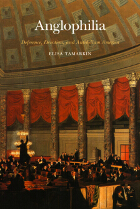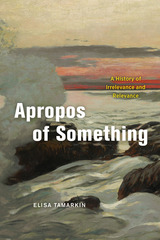2 books about Tamarkin, Elisa

Anglophilia
Deference, Devotion, and Antebellum America
Elisa Tamarkin
University of Chicago Press, 2008
Anglophilia charts the phenomenon of the love of Britain that emerged after the Revolution and remains in the character of U.S. society and class, the style of academic life, and the idea of American intellectualism. But as Tamarkin shows, this Anglophilia was more than just an elite nostalgia; it was popular devotion that made reverence for British tradition instrumental to the psychological innovations of democracy. Anglophilia spoke to fantasies of cultural belonging, polite sociability, and, finally, deference itself as an affective practice within egalitarian politics.
Tamarkin traces the wide-ranging effects of anglophilia on American literature, art and intellectual life in the early nineteenth century, as well as its influence in arguments against slavery, in the politics of Union, and in the dialectics of liberty and loyalty before the civil war. By working beyond narratives of British influence, Tamarkin highlights a more intricate culture of American response, one that included Whig elites, college students, radical democrats, urban immigrants, and African Americans. Ultimately, Anglophila argues that that the love of Britain was not simply a fetish or form of shame-a release from the burdens of American culture-but an anachronistic structure of attachement in which U.S. Identity was lived in other languages of national expression.
[more]

Apropos of Something
A History of Irrelevance and Relevance
Elisa Tamarkin
University of Chicago Press, 2022
A history of the idea of “relevance” since the nineteenth century in art, criticism, philosophy, logic, and social thought.
Before 1800 nothing was irrelevant. So argues Elisa Tamarkin’s sweeping meditation on a key shift in consciousness: the arrival of relevance as the means to grasp how something that was once disregarded, unvalued, or lost to us becomes interesting and important. When so much makes claims to our attention every day, how do we decide what is most valuable right now?
Relevance, Tamarkin shows, was an Anglo-American concept, derived from a word meaning “to raise or to lift up again,” and also “to give relief.” It engaged major intellectual figures, including Ralph Waldo Emerson and pragmatists and philosophers—William James, Alain Locke, John Dewey, and Alfred North Whitehead—as well as a range of critics, phenomenologists, linguists, and sociologists. Relevance is a struggle for recognition, especially in the worlds of literature, art, and criticism. Poems and paintings in the nineteenth century could now be seen as pragmatic works that make relevance and make interest—that reveal versions of events that feel apropos of our lives the moment we turn to them.
Vividly illustrated with paintings by Winslow Homer, Henry Ossawa Tanner, and others, Apropos of Something is a searching philosophical and poetic study of relevance—a concept calling for shifts in both attention and perceptions of importance with enormous social stakes. It remains an invitation for the humanities and for all of us who feel tasked every day with finding the point.
Before 1800 nothing was irrelevant. So argues Elisa Tamarkin’s sweeping meditation on a key shift in consciousness: the arrival of relevance as the means to grasp how something that was once disregarded, unvalued, or lost to us becomes interesting and important. When so much makes claims to our attention every day, how do we decide what is most valuable right now?
Relevance, Tamarkin shows, was an Anglo-American concept, derived from a word meaning “to raise or to lift up again,” and also “to give relief.” It engaged major intellectual figures, including Ralph Waldo Emerson and pragmatists and philosophers—William James, Alain Locke, John Dewey, and Alfred North Whitehead—as well as a range of critics, phenomenologists, linguists, and sociologists. Relevance is a struggle for recognition, especially in the worlds of literature, art, and criticism. Poems and paintings in the nineteenth century could now be seen as pragmatic works that make relevance and make interest—that reveal versions of events that feel apropos of our lives the moment we turn to them.
Vividly illustrated with paintings by Winslow Homer, Henry Ossawa Tanner, and others, Apropos of Something is a searching philosophical and poetic study of relevance—a concept calling for shifts in both attention and perceptions of importance with enormous social stakes. It remains an invitation for the humanities and for all of us who feel tasked every day with finding the point.
[more]
READERS
Browse our collection.
PUBLISHERS
See BiblioVault's publisher services.
STUDENT SERVICES
Files for college accessibility offices.
UChicago Accessibility Resources
home | accessibility | search | about | contact us
BiblioVault ® 2001 - 2024
The University of Chicago Press









